
Georgia Tech School of Civil and Environmental Engineering Annual Report 2021-2022
Leadership
Donald R. Webster, Ph.D., P.E. Karen and John Huff School Chair
Susan E. Burns, Ph.D., P.E., F.ASCE Associate Chair for Administration and Finance
John E. Taylor, Ph.D. Associate Chair for Graduate Programs and Research Innovation
Kevin Haas, Ph.D. Associate Chair for Undergraduate Programs
Adjo A. Amekudzi-Kennedy, Ph.D., F.ASCE, NAC Associate Chair for Global Engineering Leadership and Entrepreneurship
Emily Foster
Development Associate
emily.foster@ce.gatech.edu
P / 404.385.7252
School of Civil and Environmental Engineering at Georgia Tech
790 Atlantic Drive N.W. Atlanta, Georgia 30332-0355 communications@ce.gatech.edu
P / 404.894.2201
ce.gatech.edu
Words Melissa Fralick
Communications Manager
Photos and design
Amelia Neumeister
Communications Officer
ANNUAL REPORT JULY 2021 – JUNE 2022
By The Numbers
Stay in Touch
Welcome from the Chair
School News Explore Our Research A Community of Excellence The Impact of Giving What’s Inside 1 2 3 11 19 26
miss out on any School of Civil and Environmental Engineering news. Visit our website ce.gatech.edu or follow us on Instagram, LinkedIn and Facebook at CEEatGT.
Don't
With another year in the rearview mirror, I’d like to take a moment to reflect upon the many outstanding things we have to celebrate in the School of Civil and Environmental Engineering. Our community of students, faculty, staff, and alumni continue to amaze me with their dedication and service to education, research and the profession.
I’m not the only one who notices this excellence. This year, all of our degree programs—graduate and undergraduate— were ranked in the top three nationwide.
We’re continuing to build our reputation as a top destination for aspiring civil and environmental engineers. I’m happy to report that enrollment has grown over the past year, and with Georgia Tech’s extremely selective admissions process, that means our students are the best of the best. In these pages, you’ll read about some of the amazing recognition our CEE students have received.

This was also an excellent year for our faculty. Their research represents the incredible breadth and diversity of thought that’s possible within the field of civil and environmental engineering. They received millions of dollars in grants to fund their ambitious research, ranging from air quality to ionic liquids and artificial intelligence. Our faculty and students are also publishing their game-changing research in prestigious journals and pushing the limits of our collective knowledge. Their commitment to research is matched only by their remarkable dedication to teaching. A whopping four out of Georgia Tech’s 40 Student Recognition of Excellence in Teaching: Class of 1934 Awards went to instructors in CEE. These awards are given to teachers that students recognize for their excellence in the classroom, and we’re proud to have our faculty so well-represented. You can find more details about this and much more in the pages ahead. I hope you enjoy learning about what we’ve been up to in the 2021-2022 academic year. Thank you for reading and for your support of the School of Civil and Environmental Engineering.
Go Jackets!
Donald R. Webster Karen and John Huff School Chair and Professor

1 School of Civil and Environmental Engineering
FROM THE CHAIR
By the Numbers
2 2021-2022 Annual Report CEEatGT
New Faces
CEE WELCOMES NEW FACULTY
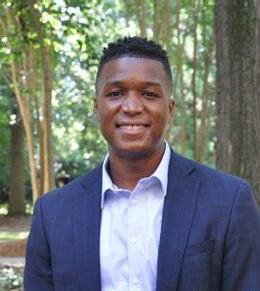
Joe F. Bozeman III
Assistant Professor

Bozeman’s research focuses on the sociodemographic impacts of the food-energy-water nexus, equity applications in energy and environmental systems and urban carbon management strategies. Bozeman comes to Tech from the University of Illinois at Chicago whre he earned his Ph.D. He holds a courtesy appointment in the School of Public Policy.
Karl F. “Fred” Meyer
Professor of the Practice
Meyer’s research interests are in lightweight and ultra-high performance concrete, as well as sustainable construction and engineering education. He comes to Georgia Tech from the United States Military Academy, West Point, N.Y., where he served as a professor and head of the Department of Civil and Mechanical Engineering. Meyer earned his master’s degree and Ph.D. in civil engineering from Georgia Tech.
Ameet Pinto
Carlton S. Wilder Associate Professor
Pinto’s research focuses on microbial ecosystems at the interface of infrastructure and public and environmental health. His research group develops microbial and molecular sensing tools and modelling approaches to monitor and manage the microbology of the engineered water cycle. Pinto comes to Tech from Northeastern University. Pinto earned his Ph.D. in civil engineering from Virginia Tech.
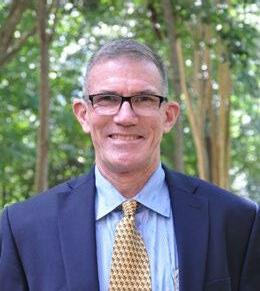
3 School of Civil and Environmental Engineering
SCHOOL
NEWS
School Expands Future Faculty Fellows Program


CEE welcomed it's largest ever cohort of Future Faculty Fellows in 2022.
In partnership with the Center for Teaching and Learning, the program aims to build the next great generation of educators, starting by supporting and mentoring student research. Fellows receive a
$1,000 stipend from the School, in addition to one-on-one mentoring with current Georgia Tech faculty. This year, CEE was awarded funding from the Provost’s Fund for Excellence in Graduate Studies and used the grant to support six more students than the previous year, expanding its program to reach more fellowship
candidates from groups traditionally underrepresented in engineering. This year’s fellows have pursued interests ranging from stormwater pollutants to transportation workplace culture and have shown a bright, promising future in academia. Learn more about them below:
Rafegh Aghamohammadi
Ph.D., Transportation Systems Engineering
Research: Mathematical modeling of traffic dynamics in largescale urban networks
Luna Al Hasani
Ph.D., Structural Engineering, Materials and Mechanics
Research: Alternative modeling approaches to predict concrete’s thermal behavior
Boyoung Jeon
Ph.D., Geosystems Engineering
Research: Impact of motile bacteria on multiphase flow in porous media.
Juhee Kim
Postdoc, Environmental Engineering
Research: Analytical techniques and treatment processes to remediate contaminated water

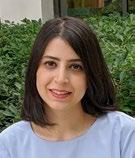
Becca Kiriazes
Ph.D., Transportation Systems Engineering
Research: Attitudes and perceptions of using shared mobility during the pandemic
Chenying Liu
Ph.D., Geosystems Engineering
Research: Developing strong ground motion and earthquake damage models

Xiaofeng Liu

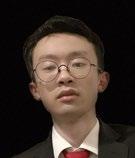

Ph.D., Water Resources Engineering
Research: Lake water quality assessment using data driven method and numerical modeling
Amy Luettich Stypulkowski
Ph.D., Geosystems Engineering
Research: Optimizing post-construction stormwater best management practices
Hongyu Lu
Ph.D., Transportation Systems Engineering
Research: Modeling vehicle activity to population exposure to traffic-related pollutions
Alex Muscalus
Ph.D., Ocean Science & Engineering
Research: Container ship wake and its coastal impacts along shipping channels
Xinyi Wang

Ph.D., Transportation Systems Engineering

Research: Impact of teleworking on the transportation system in the post-pandemic world
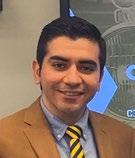
4 2021-2022 Annual Report
SCHOOL NEWS
Values-Based Leadership: Building the Right Culture for Your Business
More than 30 years after founding construction management firm MBP, Blake Peck, MS CE 78, is confident that its success is thanks to the strong values he and his team have lived by over the years.
Peck, who delivered the Fall 2021 Lecture for the Kenneth Hyatt Distinguished Leadership Speaker Series on Oct. 5, told the audience that those values are deeply ingrained. In 1989, when Peck and his business partners Charlie Bolyard and Frank McDonough decided to start their own company, they began with their values.
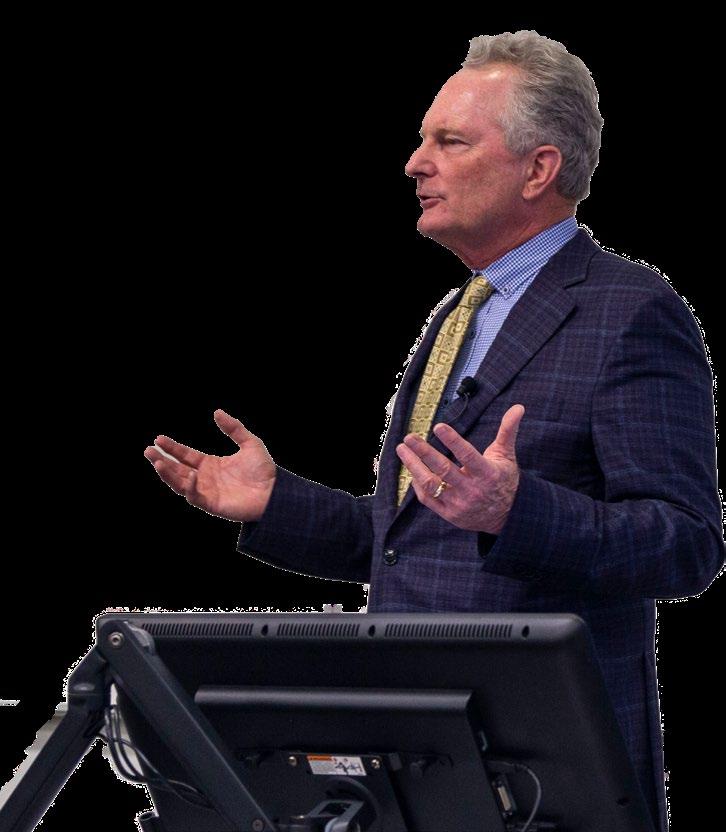
“The overriding theme was we wanted to do things the right way and build a company that we would want to work for, even if we didn’t own it,” Peck said.
MBP – which stands for the initials of the three partners – was created on the back of a napkin in a Virginia bar with a goal of employing 4-5 people and doing $450,000 in business in its first year. Today, after more than 30 years in business, MBP is a Top 50 firm that employs more than 300 people at 15 locations around the country.

Peck attributes this success to the company’s relentless commitment to its values. With multiple offices around the country, MBP maintains its consistency by prioritizing values with everyone who joins the team, Peck said.
Peck shared MBP’s six value statements with the audience: we are one team, we deliver quality, we act with integrity, we are driven to succeed, we are innovative, and we care about our community.
Peck said the company is more diverse than it was when it was founded in the late 80s. This happened organically, he said, by giving people opportunities and pathways to advance.
“The chair of our board is a woman who started at 19 as an intern for us,” Peck said.
Peck stepped down as CEO earlier this year following a successful ownership transition, though he is still with the company.
“We completed the dream,” Peck said of the vision he and his co-founders shared when they set out to create MBP, “that even if we didn’t own this company we’d still want to work for it.”
Blake Peck
KENNETH HYATT DISTINGUISHED LEADERSHIP SPEAKER FALL 2021
5 School of Civil and Environmental Engineering
“The overriding theme was we wanted to do things the right way and build a company that we would want to work for, even if we didn’t own it.”
SCHOOL NEWS
CEEs are Leaders in Climate Change Mitigation and Adaptation
Rudy Bonaparte knows one thing for sure: Earth’s atmosphere is warming, and civil and environmental engineers will lead the way toward mitigating the damage and adapting our infrastructure to the effects of climate change.

Bonaparte shared his wisdom from decades of engineering experience as the Spring 2022 speaker for the Kenneth Hyatt Distinguished Leadership Speaker Series. Bonaparte is the co-founder and chairman of Geosyntec Consultants and a professor of the practice in the School of Civil and Environmental Engineering. From his years leading Geosyntec and teaching students about global engineering leadership, Bonaparte knows what it means to be a leader in business, academia and climate change solutions.
A warmer Earth has led to changing climate patterns with adverse effects at all levels. Recent weather events in the U.S. illustrate these changes, which are projected to increase over time: water depletion and drought in the West, more intense gulf and East Coast hurricanes, and more extreme precipitation events.
Models from the Intergovernmental Panel on Climate Change project that continued carbon dioxide emissions will create a temperature increase of 2 degrees Celsius by the end of the century.
“Let’s say you’re going to graduate in 2022 and have a 40-year career,” Bonaparte said. “Your career will span the period when mankind’s actions will determine the ultimate severity of climate change impacts on the world. You’re going to be in the thick of it.”
As future civil and environmental engineers, Bonaparte told students they have a responsibility to be leaders in abating the climate change crisis by building awareness, advocating for policy change, participating in professional organizations, and encouraging their employers to implement low carbon and sustainable practices.
Over the course of their careers, civil and environmental engineers will be involved in two parts of the solution, Bonaparte explained: mitigation and adaptation.
“This is a wonderful time to be a civil and environmental engineer. You’ll get to use so many of the wonderful skills you’re learning here and in doing so, you get to make the world a better place,” Bonaparte said. “You can make a real difference for good. As civil and environmental engineering leaders, you have a responsibility to do so, and I hope you will during your careers.”
6 2021-2022 Annual Report
“This is a wonderful time to be a civil and environmental engineer. You’ll get to use so many of the wonderful skills you’re learning here and in doing so, you get to make the world a better place.”
Rudy Bonaparte
KENNETH HYATT DISTINGUISHED LEADERSHIP SPEAKER SPRING 2022
SCHOOL NEWS
Joe S. Mundy Global Learning Endowment
Following years of pandemic restrictions, 2022 brought a resurgence of international travel. Two students utilized Mundy funds to explore and gain new cultural perspectives: Zone Genet traveled over fall break to the Netherlands and Germany and Emily Lau participated in an exchange program with University College London.
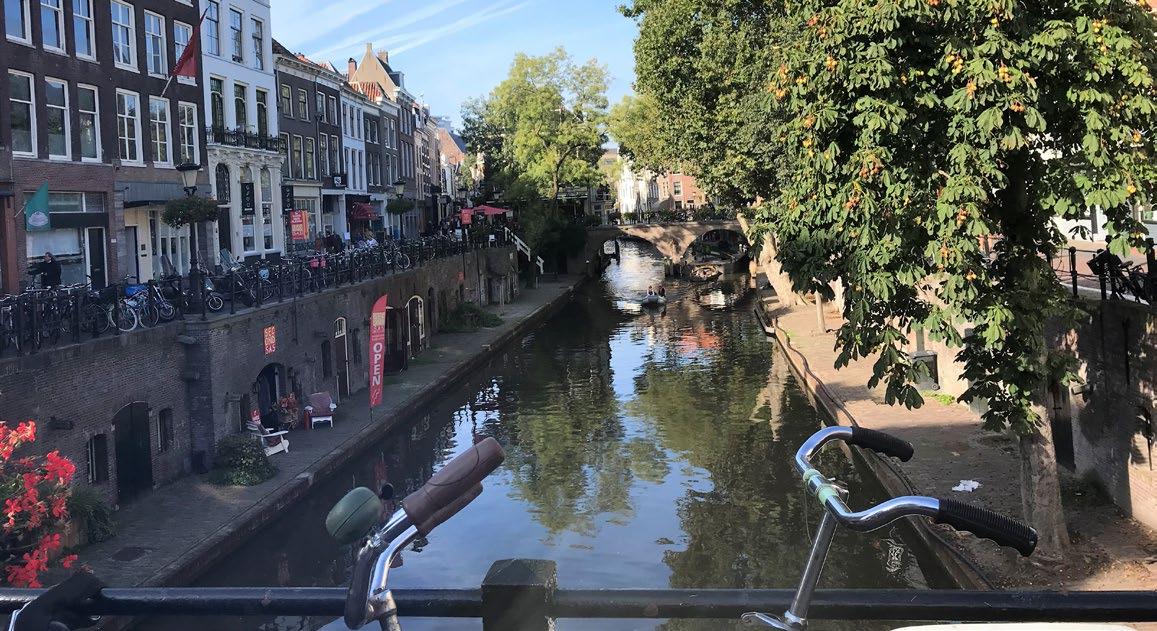

The Joe S. Mundy Global Learning Endowment provides financial support for CEE students to travel for the purpose of cross-cultural development.


Students Impress with Innovative Concepts at Entrepreneurial Impact Competition
At the second annual Entrepreneurial Innovation Competition, two teams of CEE students wowed a panel of judges and walked away with $5,000 to take their inventions to the next level.
With their ideas to improve road safety and track harmful algae growth, the winning teams demonstrated the breadth and capacity that civil and environmental engineers possess to improve the human condition.
Following an open call for submissions in the Fall 2021 semester, four finalists were selected to participate in the competition held virtually on Jan. 28, 2022.
During the competition, each of the finalists gave a five-minute verbal pitch of their projects to a panel of expert judges and a live audience, followed by 10 minutes of questions from the judges. After all the presentations, the judges deliberated and selected the top proposals to win the Higginbotham Entrepreneurship Award and the Zeitlin Innovation Award, worth $5,000 each.

PhycoSight, a team comprised of environmental engineering PhD students Benjamin Gincley and Farhan Khan, was selected to win the Higginbotham Entrepreneurship Award. The Higginbotham award recognizes teams with more developed ideas that have been tailored to specific end-users with an emphasis on bringing their concept to market.
Gincley and Khan developed PhycoSight as a lowcost, rapid, accurate and automated device to monitor water quality and combat the rapid proliferation of toxin-producing algae. Harmful algal blooms—caused by excessive nutrient discharge into water and warming temperatures due to climate change— kill fish and cause toxic discoloration and odor in drinking water supplies.
PhycoSight would provide continuous and autonomous monitoring to enable observation of the start of an algal bloom, providing the opportunity for decisive and strategic mitigative action. By providing early warning of an algal bloom upstream, PhycoSight would give drinking water utilities the ability to quickly take proactive measures to ensure safe drinking water to their communities.
“This award provides concept and strategy validation for our team in that the judges see merit in our prior work and future plans,” Gincley said. “The great ideas presented by the teams in our competition cohort have provided inspiration to both our team
and the attendees. Big civil and environmental challenges are being tackled in creative and frugal ways, reducing barriers and improving access to cutting-edge technologies that will benefit society, whether they're commercialized this year or serve as prototypes for critical technologies in 10 years' time.”
Multi-disciplinary team SECurE was selected to win this year’s Zeitlin Innovation Award. The Zeitlin award recognizes the creativity, innovation and potential of a project at any stage of development.
The SECurE team is comprised of CEE graduate students Ron Knezevich, Ariel Steele, Zhongyu Yang and Lucas Yu, along with electrical and computer engineering student Marius Francois-Marchal.
The team identified the danger that driving around curves poses for motorists: Curves account for just 5 percent of all highway miles, but curve-related crashes make up approximately a quarter of all roadway fatalities. Curve warning signs are among the best safety measures to decrease injury crashes, however it can be difficult for transportation agencies to identify where these signs are needed and keep track of those that already exist on thousands of miles of roadway.
SECurE is a low-cost solution that uses a smartphone as a data collection device. By mounting a smartphone on a vehicle, users can passively collect data during routine travel. Automated processing will accurately extract curve data that can be used to design curve warning signs to make roads safer.
“Winning this competition is confirmation that people think that our vision to improve curve safety is valuable, and that the “brainchild” of our group has the potential impact to be explored further,” Yu said.
8 2021-2022 Annual Report
SCHOOL NEWS
Students competed in the Entrepreneurial Impact Competition virtually on Jan. 28 2022. Professor Adjo Amekudzi-Kennedy served as emcee of the event.
Meet the EIC Finalists

SECurE
Marius Francois-Marchal
Ron Knezevich
Ariel Steele
Zhongyu Yang
Lucas Yu
Driving around curves can be dangerous for motorists. Curves account for just 5% of all highway miles, but curve-related crashes make up approximately a quarter of all roadway fatalities.
Curve warning signs are among the best safety measures and are known to decrease injury crashes by approximately 30%. However, it can be difficult for transportation agencies to identify where these signs are needed and keep track of those that already exist on thousands of miles of roadway. This is for two main reasons: manual interpretation is needed for every curve and there is a lack of existing warning sign inventory.
SECurE is a low-cost solution that uses a smartphone as a data collection device. Created by CEE graduate students Ron Knezevich, Ariel Steele, Zhongyu Yang and Lucas Yu, along with electrical and computer engineering student Marius FrancoisMarchal, SECurE works by mounting a smartphone on a vehicle so users can passively collect data during routine travel. Automated processing will accurately extract curve data that can be used to design curve warning signs to make roads safer.
3D-Printed Wood
Katy Bradford
The construction industry faces many challenges in the future: high material costs, low labor availability and a growing population in need of housing. Civil engineering student Katy Bradford proposes using 3D printing technology to create a low-cost, low-carbon building material to rapidly develop the affordable, green housing of the future.
3D-printed wood is largely composed of cellulose, the most abundant polymer on Earth. With the benefits of carbon sequestration, material availability, biodegradability, and optimal mechanical properties, the use of cellulose fibers in building materials can significantly reduce the energy consumption of buildings at a low cost.
In addition to its sustainability, 3D-printed wood utilizes automation to offset shortages in labor and reduce the timeline of a construction project. This offers the potential to rapidly provide housing at a reduced cost—an issue of critical importance around the globe.

9 School of Civil and Environmental Engineering
SCHOOL NEWS
Virus Track
Wensi Chen
Zeou Dou
Eric Mei
Wastewater surveillance testing is an emerging epidemiological tool to monitor municipal sewage for traces of infectious pathogens, like Covid-19, in entire communities. Through wastewater testing, researchers can confirm whether a viral pathogen is present in the population and whether transmission is increasing or declining.
A limiting factor is that this process requires refrigeration for virus sample handling, so the high-cost cold chain processes greatly limit the implementation of large-scale virus surveillance.
The VirusTrack team, comprised of environmental engineering PhD candidates Wensi Chen and Zeou Dou and undergraduate student Eric Mei, created a sampling and storage technology that doesn’t require refrigeration.
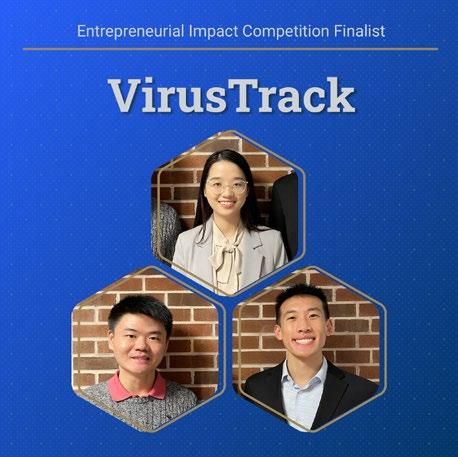
Through their low-cost and reliable solution, packed viruses can be stabilized and preserved for a prolonged period at room temperature before extraction for testing, which could help to facilitate and expand the coverage of the surveillance network.
PhycoSight
Benjamin Gincley
Farhan Khan
The rapid proliferation of toxin-producing algae—known as harmful algal blooms—present a grave threat to inland water quality. Caused by excessive nutrient discharge into water and warming temperatures due to climate change, harmful algal blooms (HABs) kill fish and cause toxic discoloration and odor in drinking water supplies.
Environmental engineering Ph.D. candidates
Benjamin Gincley and Farhan Khan have a plan to combat the threat of HABs through the development of PhycoSight: a low cost, rapid, accurate and automated device to monitor water quality.
Continuous and autonomous monitoring would enable observation of the start of an algal bloom, providing the opportunity for decisive and strategic mitigative action to be taken. By providing early warning of an algal bloom upstream, PhycoSight would give drinking water utilities the ability to quickly take proactive measures to ensure safe drinking water to their communities.
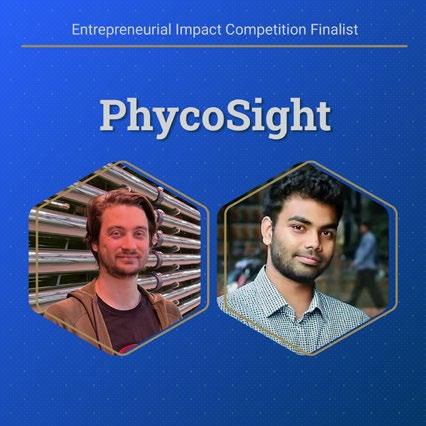
10 2021-2022 Annual Report
SCHOOL NEWS
RESEARCH Explore Our
11 School of Civil and Environmental Engineering
Arson Selected for National Science Foundation’s BRITE Award
Associate Professor Chloé Arson has been selected for a 2021 BRITE Award from the National Science Foundation, providing funding that will allow her to take her research in a new direction.
BRITE—which stands for Boosting Research Ideas for Transformative and Equitable Advances in Engineering— aims to create opportunities for experienced faculty to advance scientific discoveries and new research.
Arson’s proposal was accepted as part of the BRITE Pivot Track. One of four tracks within the initiative, the Pivot Track enables researchers to adapt to the fast-moving pace of research and create new knowledge in their field by infusing new concepts from a different discipline or sub-field.
For Arson, this means incorporating artificial intelligence into her geosystems engineering research.
“This award will give me a fantastic opportunity to take time to catch up with new developments in computational mechanics and to integrate what I have learned in multi-scale modeling over the last decade with the latest algorithms used in deep learning,” Arson said.
With the award, Arson aims to capture the persistence in time of features that are described in space and to better understand how the components that make up a heterogenous material evolve towards stable or instable microstructures exhibiting measurable properties.
“I am also excited to start a new collaboration with an expert in AI and geomechanics, Professor Steve Sun from Columbia University, and to explore innovative ideas to transform upscaling methods,” Arson said.
Beginning Jan. 1, 2022, Arson will receive $525,070 over three years for her proposal, “Micro-Macro Modeling of Reactive Flow and Rock Weathering Enhanced by Artificial Intelligence.”
Arson explained that the idea for her proposal is to use artificial intelligence to identify the scales needed to break down a composite material. Composite materials are those made up of more than one thing, like rocks composed of different minerals, or polycrystals made of crystals of different orientations. One of Arson’s targeted engineering applications is enhancement of safety and sustainability of
long-term underground geological storage facilities, which are built in chemically reactive rocks.
The use of artificial intelligence in computational geomechanics is still in its infancy. Arson hopes to make meaningful advances in applied mechanics, including the modeling of open thermodynamic systems, the development of a new class of adaptive micro-macro models and applications over a wide range of spatiotemporal scales.
“I strongly believe that if this research is successful, it can open new avenues for how we do multi-scale modeling, not only for rocks but for other materials and for disciplines other than civil engineering,” Arson said.
For example, understanding chemical weathering processes in the bedrock will play a central role in understanding nutrient supply, landslide hazards, and the global carbon cycle. Highlighting hidden correlations between topological features and phenomena will also advance the fundamental understanding of the behavior of solid and soft matter, Arson said.
Over the last few years, Arson has observed that more of her engineering students are interested in incorporating computer science and machine learning into their work. Intrigued by these emerging
fields, Arson began learning more about coding and computer science in her spare time. In 2020, she took courses in machine learning and assembled the proposal for the BRITE research project.

The proposal incorporates another component of great importance to Arson: diversity and inclusion. Dovetailing with her role as chair of the School of Civil and Environmental Engineering’s Committee for Diversity and Inclusion, the BRITE Award will allow Arson to create multi-semester undergraduate research opportunities and international research experiences; develop a diversity, equity and inclusion (DEI) seminar series; and co-design innovative inclusion metrics in engineering.
“I was delighted to see that the NSF made it a requirement to develop a diversity plan for this grant. I have been working on several ideas to integrate DEI training and awareness on campus and in the profession, and this grant gives me support to implement some of these ideas,” Arson said. “I hope that the visibility gained by the research and education work that we do will contribute to a bold, creative and inclusive culture at Georgia Tech and beyond.”
12 2021-2022 Annual Report
RESEARCH
Jorge Macedo Receives Prestigious NSF CAREER Award

Assistant Professor Jorge Macedo has won a 2022 Faculty Early Career Development (CAREER) Award from the National Science Foundation.
The CAREER Award is the National Science Foundation’s most prestigious award for earlycareer faculty, recognizing those with potential to lead advances in their fields and serve as role models in research and education.
Over the course of five years, Macedo will receive more than $581,000 for his proposal, “Towards the Next Generation of DataDriven and Performance-Based Multiscale Procedures in Mining Geotechnics.”
“Getting the CAREER award is a great honor and motivates me to keep improving as a researcher, educator, mentor, and engineer,” Macedo said. “The CAREER award will provide significant momentum to my current research efforts and enable paths for very exciting collaborations.”
Macedo hopes to utilize data science as a tool to reshape the field of mining geotechnics, with a focus on improving the safety of high-risk infrastructure like tailings storage facilities. Tailings are the soil-sized geomaterial waste created in mining operations when valuable minerals are separated from an ore deposit. Tailings are typically mixed with water to form a slurry that facilitates transport by pipeline to a tailings storage facility.
Over the past decade, tailings storage facility failures around the world have caused catastrophic environmental consequences and human losses. A similar failure in the United States could cause dramatic damage to the economy, environment, and nearby communities. Therefore, designing more resilient tailings storage facilities and better assessing the condition of existing ones is vital for regions where mining is active, such as Arizona, Nevada, Colorado, and Utah.
With his CAREER project, Macedo aims to apply new technologies—data-driven and performance-based procedures using machine and active learning—to provide novel insights that could improve the resilience of tailings storage facilities and set new standards for mining infrastructure in general.
Macedo hopes this project will be the foundation for an interdisciplinary field at the convergence of data science, mining geotechnics, and
performance-based engineering—demonstrating the power of data-driven approaches to the geotechnical and hazard communities.
As part of the CAREER Award, Macedo will integrate research, educational, and outreach components over the course of the five-year project.
His education plan will engage undergraduate, graduate, and K-12 students in Georgia Tech vertically integrated projects, which include undergraduate and graduate students in ambitious, long-term, multidisciplinary project teams led by faculty. Specifically, the students engaged with Macedo’s group will be working on problems at the convergence of geotechnics and data science. Macedo also plans to collaborate with STEM centers at Georgia Tech and other institutions in the United States that promote the resilience of mining infrastructure. In particular, Macedo plans to engage the TAilings and IndustriaL waste ENGineering Center (TAILENG) that he founded and chairs to implement efforts that contribute to creating the next generation of tailings engineers with literacy in data science.
In addition, Macedo’s outreach plan will establish a peer mentoring program for Hispanic and Latinx students in collaboration with the Georgia Tech GoSTEM, Latino Organization of Graduate Students (LOGRAS), and Mentor & Mentee (M&M) programs. The pilot program will pair first-year students with juniors, sophomores and seniors, and seniors with graduate students.
13 School of Civil and Environmental Engineering
RESEARCH
Faculty to Study Sustainability in New Artificial Intelligence Center

A team from Georgia Tech has been awarded a five-year, $20 million grant by the National Science Foundation (NSF) to fund the NSF Artificial Intelligence (AI) Institute for Advances in Optimization (AI4OPT). AI4OPT will focus on bringing together the fields of artificial intelligence and mathematical optimization to achieve research breakthroughs in automated decision making that could not be attained separately.
The team is driven by use cases in several areas of significant societal impact: energy systems and the use of massive, distributed renewable resources and demand response programs; green supply chains to support the growth of e-commerce; resilience and sustainability, particularly in how to develop local food production; and circuit design and control for accelerating the development of new computing systems that can solve these evermore challenging problems.
The resilience and sustainability thrust is led by Civil and Environmental Engineering Professor Yongsheng Chen. Chen is joined by fellow Environmental Engineering Professor John Crittenden and five other researchers from Georgia Tech and the University of Southern California.
The resilience and sustainability team is working to address challenges facing our food system, including projected nutrient cost and scarcity and the wide-spread eutrophication of water supplies.
Researchers Awarded $1M to Convert Trash into Fuel
Researchers from Georgia Tech’s School of Civil and Environmental Engineering have received $1.1 million from the U.S. Department of Energy to create equipment to efficiently convert nonrecyclable municipal waste into jet fuel.
The award is a portion of a $2.5 million project in which the researchers, led by Associate Professor Sheng Dai and Professor Susan Burns, will collaborate with partners including the Gas Technology Institute, Idaho National Lab, and Waste Management.
Non-recyclable municipal solid waste is household garbage that includes things like cardboard, fibers, plastics and tree limbs. Researchers are investigating methods to shred this kind of municipal waste into small particles that can then be chemically processed into jet fuel.
The organic components of the solid waste will be converted into fuel using a process known as thermal oxidation, which converts the solid waste into a mixture of gases primarily composed of hydrogen, methane, carbon monoxide and carbon dioxide. The mixture is known as synthesis gas or syngas, which provides a feedstock that can be converted into fuel sources, such as jet fuel or gasoline.
The goal of this project is to create a more sustainable solution for household waste while creating a new source of fuel with a lower carbon footprint.
“For me, the most exciting aspect of this project is the potential to convert materials that are being disposed in landfills into an economic resource,” Burns said. “When averaged per capita, each person in the state of Georgia sends about six pounds of trash to a landfill each day, so projects like this one hold promise for significant reduction in our need for landfill capacity in the future.”
Standing in the way of this goal is the reality that these small particles of household waste, which typically measure 6 millimeters or less, are difficult to move. They tend to be soft and often jam in machinery.
“These particles will not flow easily through industrial equipment,” Dai said. “We do not fully understand their flow behavior.”
With this grant, principal investigators Dai and Burns, along with geosystems engineering Ph.D. students Yimin Lu, Ryann Khalil and Abdallah Ikbarieh, will focus on the technical aspects of upscaling the process.
Over the course of the three-year project, they will quantify the chemical composition and model the physical flow behavior of solid waste particles, which will lay a foundation for the life cycle and techno-economic analyses of this technology. This work will also aid in developing the next generation of machinery to handle such waste particles.
“Technically, we can already do the conversion from waste to jet fuel but the cost is too high,” Dai said. “Handling is very expensive, especially when the particles are jammed and cannot flow. The overarching objective is to produce jet fuel with an economically feasible process.”
14 2021-2022 Annual Report
RESEARCH
Researchers Receive $2.5 M Grant to Focus on Improving Atlanta-Area Transportation Through Holistic Community Approach
Researchers from Georgia Tech have been awarded a $2.5 million National Science Foundation Smart and Connected Communities Grant to develop systems that will improve travel mobility, safety, equity, and sustainability using the city of Peachtree Corners, Ga., as an immersive living lab.
During the course of the four-year project, the research team will develop tools and evaluate policies that will allow communities to leverage advances in information, communication, and sensor technologies in a quantifiable manner to achieve sustainable travel goals.
The project’s principal investigator, Frederick R. Dickerson Chair and Professor Srinivas Peeta, explained that the crux of the work lies in analyzing and fusing qualitative and quantitative data from a variety of sources including emerging technologies—like sensors that collect large volumes of data—and communications strategies like community feedback surveys.
Through this grant, the research team will address the challenges of how to integrate disparate, multi-source data from various stakeholders and use it to systematically
generate solutions — in the form of partnerships, behavioral interventions, and policy interventions — to meet sustainability objectives at the community level in a systematic, quantifiable manner over time.
“We are making steps toward real-time policy analysis and program evaluation with information-based strategies,” said the project’s Co-PI Omar Asensio, an assistant professor in Georgia Tech’s School of Public Policy and director of the Data Science and Policy Lab.
The move toward real-time analytics can be faster, cheaper and potentially more accurate than traditional government transit surveys, which are slow, costly, and update relatively infrequently, he said.
The goal is that after four years, the model will be sustainable in Peachtree Corners and can be replicated in other communities.
“By the end of this project, we hope to have a framework that can be transferred to any city with a smart and connected framework,” Peeta said. “If they’re able to do it there, then it’s transferable elsewhere.”
Kaiser receives NOAA Grant to Study Urban Air Quality
Assistant Professor Jennifer Kaiser is leading one of 11 projects to receive funding from the National Oceanic and Atmospheric Administration (NOAA) Climate Program Office’s Atmospheric Chemistry, Carbon Cycle, and Climate (AC4) program in Fiscal Year 2021. The competitively selected projects aim to increase our understanding of emissions and chemical transformation in the urban atmosphere.

Despite decades of decline in ground-level ozone and fine
particulate matter, many U.S. metropolitan areas still violate the 8-hour ozone standard as regulated under the Clean Air Act. This could be a result of unanticipated trends in emissions, increasing influence of regional background sources, long-range transport, changes in atmospheric chemistry, and/or a consequence of a changing climate with heat waves in the United States becoming more frequent, longer in duration, and more intense.
To improve our understanding of emissions and chemical reactions that affect urban air quality and climate, the NOAA Chemical Sciences Laboratory is planning the Atmospheric Emissions and Reactions Observed from Megacities to Marine Areas (AEROMMA) aircraftbased field campaign to collect new observations from megacities to
marine environments, currently scheduled for the summer of 2023.
Kaiser’s project will deploy the In Situ Airborne Formaldehyde (ISAF) instrument on the NOAA WP-3D aircraft during the AEROMMA field campaign, and use formaldehyde measurements to examine the emissions and fate of volatile organic compounds (VOCs) in urban environments.
Formaldehyde plays a central role in atmospheric oxidation processes as both a product of VOC oxidation and a source of oxidants. AEROMMA measurement priorities include detailed VOC speciation, and formaldehyde is a key component of the VOC pool. This study will enhance researchers’ ability to predict air quality now and in the future as a function of increasing urbanization and rising temperatures.
15 School of Civil and Environmental Engineering
RESEARCH
Reusable Ionic Liquid Enables Extraction of Rare Earth Elements
Researchers from Georgia Tech’s School of Civil and Environmental Engineering have discovered a way to extract rare-earth elements— essential ingredients for nearly all modern electronics—from the ash left behind at coal-burning power plants using a non-toxic ionic liquid.

In a paper published in ACS’s Environmental Science and Technology, the Georgia Tech researchers showed that by applying an ionic liquid directly to solid coal fly ash, rare-earth elements can be successfully removed in a safe process that creates little waste. The study is co-led by Ching-Hua Huang, a professor of environmental engineering and recent Ph.D. graduate Laura Stoy. A third co-author, Victoria Diaz, is an undergraduate student who joined the lab as part of Georgia Tech’s Summer Undergraduate Research in Engineering/ Sciences (S.U.R.E.) program.

Rare-earth elements (REEs) are a set of 17 elements that are utilized to make everything from permanent magnets in windmills to LED screens for computers and smart phones. While rare-earth elements aren’t as scarce as their name implies, only a few locations around the globe have deposits large enough to mine directly. Many of these reserves are in politically sensitive locations, resulting in global supply chain tensions.
Finding New Sources
Geopolitical tensions are exacerbating the scarcity of REEs,
which are critical across many industries, such as renewable energy, national security and consumer technology. To ensure their supply, researchers are looking at alternative resources for REE recovery.
The U.S. Department of Energy is funding efforts to recover REEs from coal and coal combustion residuals. A promising source is coal fly ash, which is a byproduct from coalfired power plants. This waste produced by burning coal for power can have concentrations of REEs similar to those found in raw ores.
Stoy said one of the exciting aspects of their research is finding a safe way to utilize the 130 million tons of coal fly ash that are produced in the United States every year. While some coal fly ash can be reused in concrete and construction products, most of it ends up sitting in landfills. Some of these landfills aren’t lined, making surrounding communities susceptible to dangerous elements like mercury, chromium, and lead that may leach out and contaminate nearby water supplies.
Ionic Liquids Could be the Key
Scientists know that coal fly ash contains high concentrations of REEs, but current methods of extracting these precious materials are hazardous and require several purification steps to obtain a usable product.
Huang and her research team have discovered a new method that utilizes an ionic liquid that is reusable and environmentally benign. Ionic liquids have only gained traction for use in metallurgy over the last decade, and this research represents the first time that ionic liquids have been directly applied to solid coal ash.
“This methodology is a significant paradigm shift away from the digestion of coal ash by strong acids or bases typical in other
REE recovery methods,” Huang said. “This new approach is safer industrially, and is more environmentally sustainable with the recyclability of the ionic liquid.”
The ionic liquid the researchers used, betainium bis(trifluoromethylsulfonyl) imide or [Hbet][Tf2N], selectively dissolves rare-earth oxides over other metal oxides. This ionic liquid is also unique because it dissolves into water when heated and then separates into two phases when cooled.
The researchers tested this ionic liquid on two types of coal fly ash. Class F ashes have a minimum of 70 percent by mass of primary oxides such as silicon oxides, aluminum, and iron oxides. Class C ashes contain less of these oxides, but also tend to have more calcium.
The researchers pretreated Class F coal fly ash with an alkaline solution and dried it, a step not needed for less recalcitrant Class C fly ash. Then, they heated ash suspended in water with [Hbet] [Tf2N], creating a single liquid phase. When cooled, the solutions separated. The ionic liquid extracted more than 77 percent of the rare-earth elements from freshly produced ash, and 97 percent from weathered ash that had spent years in a storage pond.
The researchers say that this low-waste approach produces solution rich REEs, with limited impurities, and could be used to recycle precious materials from the abundance of coal fly ash held in storage ponds.
16 2021-2022 Annual Report
RESEARCH
Ching-Hua Huang and Laura Stoy
Protecting Rural Schoolchildren from Prescribed Fire Emissions

A $1 million award from the U.S. Environmental Protection Agency (EPA) will help researchers in the Georgia Tech College of Engineering develop tactics to protect children from harmful emissions from controlled wildland burns. The initiative will provide equipment and new communications approaches in middle and high schools in Albany and Columbus, Ga., and Phenix City, Ala. Georgia Tech is focusing on the three cities because of their proximity to regular controlled burns, in addition to the communities’ lower socioeconomic statuses.
For one year, the researchers will deliver daily fire impact forecasts to each school, while also installing air purifiers and low-cost air quality monitors. Data from those monitors will be broadcast in real-time inside and outside classrooms. The Georgia Tech team will also create new curricula for teachers and students that increase understanding of air pollutants, their sources, and mitigation measures.
The Georgia Tech team consists of members in the School of Civil and Environmental Engineering (CEE), School of Chemical and Biomolecular Engineering (ChBE), and the Center for Serve-Learn-Sustain.
“Air pollution leads to more premature deaths than virtually all other environmental exposures. In the Southeast, prescribed burning is a major source of air pollution: it releases more particulate matter into
the air than cars, trucks, factories, and power plants,” said Armistead (Ted) Russell, the Howard T. Tellepsen Chair and Regents’ Professor in CEE. “Children in areas that experience prescribed burning smoke are uniquely vulnerable. We are excited to work with schools to identify effective measures that can be used to help protect schoolchildren.”
Russell and his colleagues have decades of experience studying emissions. His previous studies found that prescribed burns led to highly elevated emissions in southern Georgia, especially during the peak burn period from January to April.
The award will allow Russell and CEE Principal Research Engineer Talat Odman to expand Georgia Tech’s Southern Integrated Prescribed Fire Information System (SIPFIS), which they helped create in 2015. The tool merges prescribed fire and air quality data into a common analysis framework, providing a unified prescribed fire database for the southern U.S.
The Link Between Transit and Early Covid Cases
Researchers from Georgia Tech’s Colleges of Engineering and Computing have completed the first published study on the link between America’s mass transit use and Covid-19 cases at the beginning of the pandemic.
Using data from the Federal Highway Administration’s National Household Travel Survey, the team looked at the nation’s 52 largest metropolitan areas and each community’s likelihood of riding buses and trains. They then compared the numbers with the 838,000 confirmed Covid cases on the Johns Hopkins Center for Systems Science and Engineering’s dashboard from Jan. 22 – May 1, 2020.
The timeframe covers the initial days, weeks, and months of the pandemic, before mask mandates were in place and prior to widespread social distancing. Ventilation on public transit had yet to be addressed, along with other public health measures that
have since become the norm.
The study found that cities with high-usage public transportation systems displayed higher per capita Covid incidence. This was true when other factors, such as education, poverty levels, and household crowding, were accounted for. The association continued to be statistically significant even when the model was run without data from transit-friendly New York City.
The paper, “Investigating the association between mass transit adoption and COVID-19 infections in US metropolitan areas,” is published in the journal Science of the Total Environment. While the researchers don’t suggest that transit is the sole cause of the high incidence rates, they say it could have been an important factor early in the pandemic.
The research team got the idea of tracking transit and Covid cases after watching early reports from Wuhan, China, and reflecting
on how differences in public transportation systems may factor into pandemic spread patterns. As assumptions were being made about how American cities should react based on ridership patterns on the other side of the globe, Civil and Environmental Engineering Professor John E. Taylor thought the pandemic shouldn’t be treated as a “one size fits all” situation.
“In the initial months of the pandemic, models were being developed here at home based on incidence rates in Wuhan. But, in terms of mass transit ridership behavior, China’s may be far different than what we see in American cities,” said Taylor. “For instance, people in Chinese urban areas often stand in long, single file lines as they wait for trains and buses. We don’t. Different spread patterns can develop because of differences in mass transit behaviors.”
17 School of Civil and Environmental Engineering
RESEARCH
A Framework for Equity in Energy and Environmental Engineering
As diversity, equity, and inclusion continue to be among the nation’s most important focus areas, a Georgia Tech researcher has created a framework to help his peers utilize more equitable data in their energy and environmental engineering studies.

One of Joe Bozeman’s core research areas is America’s food consumption habits and how they affect climate change, specifically greenhouse gas emissions. The assistant professor in Georgia Tech’s School of Civil and Environmental Engineering looks at food intake across a number of groups, including socioeconomic status, race, and age. Using that data, he’s able to create models that better inform communities and assist policy makers.
However, the most consistent, thorough data he uses to develop those models are from 2005-2010. Five-year datasets before and after that timeframe aren’t standardized, as all sociodemographic groups are not included. This makes it difficult for Bozeman to draw comparisons that are inclusive of everyone across spatial scales and time periods.
It’s one reason why he and researchers at Carnegie Mellon University and the University of Colorado Denver have published a framework and 10-step process to help engineers, scientists, and community members standardize their data related to energy and environmental topics. Their goal is to integrate equity into these fields, a practice Bozeman and his colleagues call systemic equity. By doing so, they hope to create a system that all demographics of groups are included, including age groups, income levels, race, and ethnicity.
The framework and process are outlined in a new paper, published by the journal Environmental Engineering Science
“This is to help stabilize our sociopolitical systems, as well as those within civil and environmental engineering,” said Bozeman, who also has a courtesy appointment in the School of Public Policy in Georgia Tech’s Ivan Allen College of Liberal Arts. “If we are not able to manage social and infrastructure dynamics within our country in an equitable way, not only will currently marginalized groups be negatively affected now, but so will marginalized groups of the future.”
Systemic equity, the researchers say, requires the simultaneous and effective administration of three areas: resources, policy, and addressing
the cultural needs of systematically marginalized groups. Their framework also provides three categories that represent what happens when equity is only partially met.
• Ostensible equity: when resource and policy needs are met, but cultural needs are inadequate.
• Aspirational equity: when policy and cultural needs are met, but resources are inadequate.
• Exploitational equity: when resource and cultural needs are met, but policies are not.
“We wanted to provide common language and a shared understanding for when equity is ineffectively administered,” said Destenie Nock, an assistant professor of engineering and public policy and civil and environmental engineering at Carnegie Mellon. “Using consistent terms will allow researchers in our field to communicate with groups that include academia, practitioners, and community leaders.”
The group’s 10-step process for standardizing sociodemographic data practices is intended to address development, collection, and reporting norms. The team hopes the list will also facilitate systemic equity within energy and environmental life cycle assessment and decision-making.
18 2021-2022 Annual Report RESEARCH
EXCELLENCE A Community of
19 School of Civil and Environmental Engineering
Michael Rodgers Reappointed as Regents Researcher


The University System of Georgia (USG) has named Michael Rodgers a Regents Researcher, the highest academic and research recognition bestowed by the USG Board of Regents. Rodgers, whose title of Regents Researcher was renewed, is a researcher in transportation systems engineering in the School of Civil and Environmental Engineering. He’s also the deputy director of the Georgia Transportation Institute. Rodgers’ research focuses on modeling and simulating vehicle activity and emissions, including remote sensing of pollution.
Aris Georgakakos Honored for International Impact
Professor Aris Georgakakos was selected as the winner of the 2022 Steven A. Denning Faculty Award in recognition of more than three decades of global engagement and leadership in water resources science, policy, education, and human resources development. The Denning award is given annually to a Georgia Tech faculty member who has demonstrated sustained outstanding achievement and commitment to the advance of the Institute’s global engagement. In addition to his achievements in research and education, he is a highly sought-after expert who has contributed to resolving river basin disputes and managing environmental resources around the world.
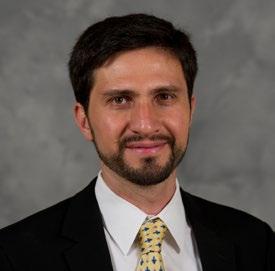

The American Institute of Steel Construction Honors Ryan Sherman
Assistant Professor Ryan Sherman was recognized as one of the American Institute of Steel Construction’s 13 award recipients for 2022. The awards program honors individuals who have made a difference in the success of the fabricated structural steel industry. Sherman received the Terry Peshia Early Career Faculty Award, which provides recognition to individuals who are on a tenure track or have received tenure with the last three years and who demonstrate promise in the areas of structural steel research, teaching, and/or other contributions to the structural steel industry.
Valdosta Traffic Calming and Connectivity Project Selected as Finalist for World Smart Cities Awards
The City of Valdosta’s smart traffic management system—created with research support from Civil Engineering Professor Baabak Ashuri—was selected as a finalist for a 2021 World Smart Cities Award in the Mobility Category. The project was funded by the Partnership for Inclusive Innovation’s Georgia Smart Communities Challenge in 2020. The city of Valdosta and its research partners piloted a smart traffic management system designed to connect all 128 city traffic signals. The effort also included systems enhancements at traffic signals and the traffic control operations center, and the installation of communications responders in 10 fire trucks.
20 2021-2022 Annual Report
FACULTY ACCOLADES
Sam Coogan, Jianfeng Zhou, Recognized in 2022 Sigma Xi Research Awards


Two CEE faculty members received 2022 Research Awards from Georgia Tech’s chapter of Sigma Xi, a national scientific honor society. Associate Professor Samuel Coogan earned a Young Faculty Award, which recognizes young teaching faculty who lead improvements in research methods and programs at Georgia Tech, as evidenced by publications and program development results. Jianfeng Zhou, an assistant professor at Georgia Tech’s Shenzen campus, won the Best Ph.D. Thesis Award for his research as a Ph.D. student. His research focuses on locally enhanced electric field treatment, a water disinfection technology, which kills pathogenic microorganisms in water.
Yongsheng Chen, Xing Xie Honored for Leadership in Environmental Engineering
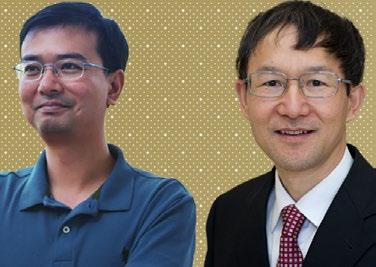
The Chinese-American Professors in Environmental Engineering and Science (CAPEES) Society has recognized faculty members Yongsheng Chen and Xing Xie for their dedication and service to environmental engineering and science. Professor Yongsheng Chen was selected for the CAPEES/Nanova Lifetime Achievement Award, which recognizes outstanding professors in environmental science and engineering who have achieved research leadership and pioneered an innovative research area. Assistant Professor Xing Xie was chosen for the CAPEES/ Nanova Young Investigator Award, an award given annually to honor an outstanding junior professor in environmental science and engineering.
CEE Instructors Earn Acclaim from Students through CIOS Awards
Five CEE instructors were recognized for their excellence in the classroom in 2021. Professor of the Practice Eric Marks earned high praise from students for his diverse presentation strategies and mentorship in student design projects. Associate Professor Francesco Fedele and co-instructor Rachel Grant were recognized for their jointled visual arts and geometry course, while Alexandra Muscalus and Maria Warren were recognized for tremendous progress in their early teaching careers as Ph.D. students. The Student Recognition of Excellence in Teaching: Class of 1934 CIOS Award recognizes just 40 instructors at Georgia Tech each year. Award winners are selected by exceptional student response rates on the CIOS (Course Instructor Opinion Survey) and top scores in three scale items: instructor’s respect and concern for students, enthusiasm about teaching, and ability to stimulate interest in the subject matter.
21 School of Civil and Environmental Engineering
FACULTY ACCOLADES
Wensi Chen Honored for Excellence in Environmental Chemistry
The American Chemical Society recognized Ph.D. graduate Wensi Chen for her research in environmental chemistry and engineering. Chen is one of 20 students nationwide selected to receive the 2021 Environmental Chemistry Graduate Student Award. The award program recognizes students with a record of research productivity and potential for future contributions as professionals in environmental chemistry and engineering. Chen’s research focuses on the design and fabrication of porous polymer beads with high water absorbency and controllable pore structure that selectively absorb target species from complex solutions.
Alexandra Israel Wins Top American Concrete Institute Scholarship
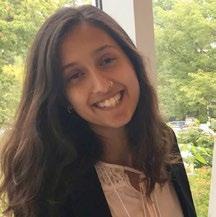

Civil engineering Ph.D. student Alexandra “Ally” Israel was recognized for her outstanding research in concrete design, winning the Georgia Chapter of the American Concrete Institute’s Sam Morris Student Scholarship in February 2022 The Georgia Chapter awards one Sam Morris Student Scholarship annually, which honors a local undergraduate or graduate student who has demonstrated interest in concrete technology, materials, design, or construction.
Mourin Jarin takes VentureLab’s Grand Prize
Ph.D. candidate Mourin “Mo” Jarin won the grand prize in VentureLab’s 2022 Innovation Competition. The Innovation Competition was hosted by the VentureLab and the Career, Research, and Innovation Development Conference. Ten Georgia Tech grad students were nominated to present their research to a panel of judges in a quick three-minute presentation. Jarin was awarded first place for her research on water disinfection devices, winning a $1,000 prize.
Alex Muscalus Named Georgia Tech’s Graduate Instructor of the Year
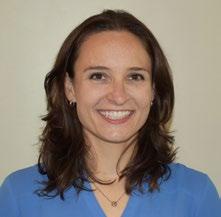
Ph.D. candidate Alex Muscalus was selected as Georgia Tech’s Graduate Student Instructor of the Year. The Graduate Student Instructor of the Year Award celebrates a graduate student who has worked as an instructor of record for at least one term during the award year. Georgia Tech’s Center for Teaching and Learning celebrates the contributions of graduate and undergraduate student instructors each year at its TA and Future Faculty Awards Day.
Zoe Zhang Named One of Nation’s Top Civil Engineering Undergraduates

The American Society of Civil Engineers selected Georgia Tech civil engineering student Zoe Zhang to its 2022 class of New Faces of Civil Engineering, which honors 10 of the brightest students from college campuses around the nation. Zhang was selected as the top honoree by ASCE’s MOSAIC, Committee on Student Members, and the National Engineers Week Committee and received a $1,000 scholarship.

22 2021-2022 Annual Report
STUDENT ACCOLADES
CEE Recognizes Outstanding Undergraduate Students
In 2022, five juniors and seniors were selected for School-wide honors recognizing their academic achievements, service, and leadership.
Aidan Labrozzi and Anthony Sanseverino received the Buck Stith Outstanding Junior Award, which honors juniors who have demonstrated both strong academic potential and a concern for the development of the School and the profession.
Thomas Papageorge and Zoe Zhang received the Buck Stith Outstanding Senior Award in Civil and Environmental Engineering. This endowed award recognizes the top graduating senior who has demonstrated both strong academic performance and contributed to the development of the School and the profession. Johanna Hall earned the School Chair’s Outstanding Senior Award in Environmental Engineering. This award recognizes a senior environmental engineering student who exhibits high academic performance, strong citizenship qualities, and leadership with a special emphasis on community service.
Six grad students recognized by Federal Highway Administration

Six master’s and Ph.D. students were awarded Dwight D. Eisenhower Transportation Fellowships, a prestigious fellowship program under the Federal Highway Administration.
Manuel Cuadra, Nakeia Jackson, Ronald Knezevich, Rachael Panik, Reid Passmore and Ariel Steele— graduate students in the Transportation Systems Engineering group—received the research grants. This year’s winners are creating innovative solutions to pressing infrastructure and transportation concerns, from crashes on rural roads to public health and safety in transportation agencies. The program’s mission is to attract the nation’s brightest minds to the field of transportation, encouraging future transportation professionals to seek advanced degrees, and helping to retain top talent in the U.S. transportation industry.
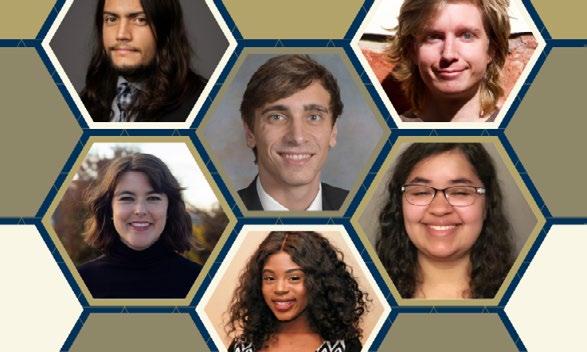
23 School of Civil and Environmental Engineering
STUDENT ACCOLADES
3 CEE Alumni Selected for Tech’s 40 Under 40

The Georgia Tech Alumni Association’s 2021 class of 40 Under 40 featured three graduates from the School of Civil and Environmental Engineering. Arjun Bir, CE 18, Jimmy Mitchell, CE 05, and Carly Queen, ME 09, MS CE 16, M CRP 16, represented the School on this impressive list of alumni who are changing the world for the better. Bir designed the Oasis E.coli test, a low-cost, water quality test that can be used by anyone without any prior training. He founded a company in Bangalore, India, to manufacture and distribute these tests worldwide. Mitchell is a sustainability engineer with Skanska who served as a project team leader for the Kendeda Building for Innovative Sustainable Design, one of the world’s most sustainable buildings. Queen leads AECOM’s Multimodal Transportation Safety Team in Georgia. In this role, she directs transportation planning and engineering efforts focused on reducing pedestrian and cyclist crashes, injuries, and fatalities across the state.
Cesunica Ivey Recognized among “Chemical & Engineering News” Talented Twelve

Cesunica “Sunni” Ivey, CE 11, MS EnvE 12, Ph.D. EnvE 16, was recognized as one of Chemical & Engineering News (C&EN) Talented Twelve, a group described by the news organization as “a dozen industrious young scientists who are trying to solve formidable global problems.” Ivey was selected for her work in developing techniques for air quality monitoring and modeling to expose the inequalities of air pollution exposure. Ivey conducted her postdoctoral research at the University of Nevada Reno and went on to become an assistant professor at the University of California, Riverside. She is now an assistant professor at the University of California, Berkeley, and the principal investigator of the Air Quality Modeling and Exposure Lab (AQMEL). Her research centers on atmospheric modeling, data assimilation, environmental justice appointments, exposure monitoring and source apportionment.
Mike Messner Honored for Service to Georgia Tech
Mike Messner, CE 76, was honored with the Joseph Mayo Pettit Distinguished Service Award, the highest award conferred by the Georgia Tech Alumni Association in honor of his outstanding support of Georgia Tech and community service. Giving back to Georgia Tech has been a central part of Messner’s life, and his support is helping the Institute maintain its position as a leader in higher education by recruiting and retaining outstanding faculty. In 2018, Messner launched the Messner Faculty Endowment Challenge, which supported the School of Civil and Environmental Engineering through dollar-for-dollar matching, up to $5 million, for endowed faculty chairs. He has also served on the Georgia Tech Foundation Board of Trustees and the Civil and Environmental Engineering Advisory Board. With his wife, Jenny, the Messners’ philanthropic giving has contributed significantly to the enrichment of the sciences, culture, and community. They founded the Speedwell Foundation, which provides full study abroad scholarships to students in central Pennsylvania and supports efforts to restore and expand public parks and green spaces in major U.S. cities. The Messners were also early supporters of the G. Wayne Clough Georgia Tech Promise Program and supporters of the Frederick Law Olmsted Professorships in the School of Civil and Environmental Engineering. He is currently a Professor of the Practice for the Scheller College of Business and the School of Civil and Environmental Engineering, where he teaches courses on management and civil engineering to the next generation of problem-solvers.

24 2021-2022 Annual Report
ALUMNI ACCOLADES
6 CEE Alumni Honored by Georgia Tech College of Engineering




The 2022 College of Engineering Alumni Awards recognized the incredible work of six CEE alumni at different stages of their careers. The Council of Outstanding Young Engineering Alumni includes rising stars who have distinguished themselves in the early stages of their careers. Members of the Academy of Distinguished Engineering Alumni are still active in their careers and have already made significant contributions to the profession, field, Institute, or society at large. The Engineering Hall of Fame celebrates alumni for their lifelong achievements. The Dean's Impact Award recognizes graduates who embrace engineering as a means to make an impact on society and who have a vision to find solutions focused on the world’s grand challenges. Learn more about this year’s honorees:
Christopher E. Brazell, CE 01, MS CE 04, won the Outstanding Young Alumni Award. Brazell is senior vice president of the West Georgia Division at EMC Engineering Services, Inc. In 2015, he became the firm’s youngest Senior Principal Owner. He is a Licensed Professional Engineer in 26 states and a Licensed Professional Land Surveyor in one state.
Emmy Montanye, CE 82, was named to The Academy of Distinguished Engineering Alumni. Montanye is a Principal and Director at Kimley-Horn and Associates, a national engineering and planning firm. She has more than 35 years of experience in civil engineering and project development in the Atlanta market in both public and private sector projects.
Dwight H. Evans, CE 70, MS EnvE 73, was named to the Engineering Hall of Fame. During his tenure at Georgia Power, Evans held a number of positions ranging from Junior Engineer to Executive Vice President. He went on to become chairman, president and CEO of Mississippi Power. He completed his career as executive vice president and group president of Southern Company, where he retired after nearly 40 years of service.
Carolyn D. Wylder, CE 75, MS CE 78, was named to the Engineering Hall of Fame. Wylder joined MARTA, the Metropolitan Atlanta Rapid Transit Authority, in 1982 to work on the construction of the rail transit system. Over the next 10 years she served in a variety of leadership positions, including as the chief civil engineer. In 1997, she was promoted to executive vice president for operations, maintenance and construction. In 2000, Wylder went into private consulting as a vice president at David Evans and Associates Inc. in Portland, Ore.
Samantha Becker, CE 16, and Shannon Evanchec, EnvE 16, received the Dean’s Impact Award. Becker and Evanchec met on campus while working in a water research group. They co-founded TruePani and won the People’s Choice Award at the 2016 InVenture Prize Competition. After earning their bachelor’s degrees, Becker (civil engineering) and Evanchec (environmental engineering) participated in CREATE-X and incorporated TruePani. TruePani is an environmental engineering, communications, and consulting firm focused on protecting public health through reducing lead in drinking water.
25 School of Civil and Environmental Engineering
ALUMNI ACCOLADES
GIVING The impact of
26 2021-2022 Annual Report
Kenneth Hyatt Distinguished Leadership Speaker Series
OUR 2022-2023 SPEAKERS
Pond & Co.
2023
The Hyatt Distinguished Leadership Speaker Series brings distinguished leaders to campus each fall and spring to share wisdom and insight with the School’s students and the wider Georgia Tech community.
It is made possible by the generous support of Kenneth Hyatt, CE 62, MS


27 School of Civil and Environmental Engineering
IM 66.
CE.GATECH.EDU/HYATT
Guiomar Obregon, MS CE 93 CEO and Co-Founder Precision 2000
Lorraine Green, ChE 84, MS EnvE 93 President (Retired)
Fall 2022 Spring
Corporate Affiliates Program



































28 2021-2022 Annual Report
GIVING
CEE Celebrates the New P2K Classroom
The School of Civil and Environmental Engineering welcomed alumna Guiomar Obregón, MS CE 93, back to the Mason Building on April 11 for a dedication ceremony to celebrate the naming of the P2K Classroom.

Obregón is the CEO of P2K, an Atlanta civil engineering firm she co-founded with her husband and fellow Georgia Tech alumnus Carlos Sánchez, MS MoT 96.
Through their philanthropy, Obregón and Sánchez put their business name on the third-floor classroom and established a scholarship aimed at Latin American women pursuing degrees in civil and environmental engineering.
“We want to give back to our community,” Obregón said. “We want to encourage other women and other Hispanics to get their education and start businesses.”
Karen and John Huff School Chair Don Webster said that the classroom is a symbol of progress for the School, which
is now more than 50 percent women.
“This classroom not only reflects the growing diversity of our programs but symbolizes the achievements that are possible for our students,” Webster said.
College of Engineering Dean Raheem Beyah thanked Obregón and Sánchez for their generosity, which provides much needed resources for Georgia Tech.
“The only way to attract the absolute best students and faculty is through philanthropy,” Beyah said. “We just cannot do what we do without donor philanthropy.”
Obregón said pursuing an education at Georgia Tech with Sánchez was pivotal to shaping their future.
“Yes, we got a great education. But we learned to overcome challenges, we learned to be resilient, we learned to solve problems,” Obregon said. “It made us the people we are today.”
29 School of Civil and Environmental Engineering
GIVING
Guiomar Obregón and Carlos Sánchez
External Advisory Board
Jim V. Anderson
Chief Executive Officer, Beacon CE 88, MS CE 89
Carlyle Bernard
Founder/President, St. Martin Consulting LLC CE 86, MS MS 94
Fred Carlson
Project Development Manager, Alliance Exchange FL CE 01, MBA 04
Alejandro Char Former Mayor, Branaquilla, Colombia MS CE 93
Christy Darden
Director Engineering, Fleet, and Sustainable Operations, Forest Service, Pacific Northwest Region CE 92
Raul Delgado
Founder and CEO, CESEL Engineers MS CE 68
Darion Dunn
Managing Partner, Atlantica Properties CE 00
Murray Griffin, P.E. Advisory Board Chair Chairman, Atlantic Coast Consulting, Inc. CE 79
Frank Evan Haren Jr., P.E. President and CEO, Haren Construction Co. Inc. CE 77
Richard H. Hummel II, CFA Founder, Commodore Investments Co-Founder, Federal Holdings, Inc. CE 89
Cayman James Project Manager, Jacobs Engineering Group CE 99, MS EnvE 01
Karen Jenkins
Managing Partner, Shear Structural M Arch 92, MS CE 93
John M. Kelley Partner and Senior Vice President, Commercial Development North American Properties CE 92
Brian Lu Founding Partner, The Leaven Group CE 99
Larry McDowell Senior Principal, Uzun+Case, LLC CE 76
Orlando R. Mendez, P.E. Chief Executive Officer, Dorado Beach Resort CE 91, MS CE 92
Edward Metzger
National Accounts Manager, Trane Inc. CE 80
Michael Montgomery Retired CE 70, MS CE 76
Rebecca Nease Retired Branch Chief, U.S. Nuclear Regulatory Commission CE 79
Guiomar Obregón CEO & Founder, Precision 2000 MS CE 93
Donald W. Paul Retired, Georgia Pacific CE 80
Alan Peljovich Practice Manager, Airport Design Consultants, Inc. CE 93
CEEatGT External Advisory Board Members provide an important outside perspective on our programs that is essential to maintaining their relevance to industry.They play a significant role in vetting programs designed for students, alumni and corporate constituencies to ensure we maintain the highest quality standards in our curriculum, practice and outreach.
Meg Pirkle, P.E. Chief Engineer, Georgia Department of Transportation MS CE 97
Jacqueline Quinn
NASA-KSC Liaison, NASA Kennedy Space Center CE 89
Franklin Rucker, P.E.
Chief of Capital Programs, Expansion and Innovation, Metropolitan Atlanta Rapid Transit Authority CE 79
Ike. J. Scott III President and CEO, Scott Bridge Company CE 74
Zakiya Seymour
Expert Management Consultant, Arcadis MS EnvE 13, Ph.D. EnvE 13
Barbara Sloan
Retired Principal, Cambridge Systematics, Inc. MS CE 77
Knox W. Tull Jr.
President, Jackson and Tull MS CE 72
H. Arthur Williams
President, Williams Steel Erection Company, Inc. CE 83
30 2021-2022 Annual Report
New Members Join External Advisory Board
Four alumni began their three-year terms on the School's External Advisory Board. We are pleased to welcome:

• Carlyle Bernard, CE 86, MS MS 94 | Founder and President of St. Martin Consulting, LLC.
• Michael Montgomery, CE 70, MS CE 76
• Guiomar Obregón, MS CE 93 | CEO and Founder of Precision 2000
• Zakiya Seymour, MS EnvE 13, Ph.D. EnvE 13 | Expert Management Consultant at Arcadis
Give to The School of Civil and Environmental Engineering
Your support provides vital resources that allow us to lead new initiatives, weather cyclical changes in government support, and make long-term investments in programs and technologies.
Your gift can be directed to CEE students, faculty, and facilities in a variety ways, depending on your interest. Please contact us to discuss what you would like to achieve by partnering with us.
Emily Foster Development Associate emily.foster@ce.gatech.edu
P / 404.385.7252
31 School of Civil and Environmental Engineering
GIVING
From left: Zakiya Seymour, Michael Montgomery, Guiomar Obregón and Carlyle Bernard
Thank You 2021-2022 Donors
We would like to express our sincere gratitude to all who made gifts to the School of Civil and Environmental Engineering over the past academic year.
INDIVIDUALS
Neel Ackerman
Alice Bachman
Bonnie Barksdale
Ronald and MaryEllen Blum
Christopher and GIllian Brazell
General Philip and Cindy Breedlove
Karen Brooks
Retina and William Calhoun, Jr.
Jim Case
Joseph Carbonnet and Elizabeth Jones
Tammy and Ab Conner, Sr.
Jo Ann Czekalski and James Stokes
Rear Admiral Patrick and
Cheryl Drennon
William D. Drinkard
Darion and Raquel Dunn
Dwight and Sharon Evans
Linda Farrell
Christopher and Mary Alexa Finke
John and Tracy Gonzalez
Paul Greene
Murray and Jan Griffin
Kevin Haas
Delane and Evan Haren, Jr.
Bill and Elizabeth Higginbotham
Michael and Jane Houlihan
Sharon Just and Jim Anderson
Mike and Jana Kaney
John and Samantha Kelley
Kendall and John Knezevich, Jr.
Eve Kuniansky
Raymond Lawing
Brig. Gen. Charles Machemehl, Jr.
Paul Mayne
Robert McKenzie, Jr.
Mike and Jenny Messner
Roger Miller
Margaret Mitchell
Marvin Mitchell, III
Emmy and David Montanye
Michael and Linda Montgomery
Bonnie and Charles "Wick" Moorman, IV
Becky Nease and Anthony Gody
Charles Nelson
Guiomar Obregón and Carlos Sanchez
Blake and Mary Peck
Andrew and Barbara Phelps
Stacie Sire and Daniel McGinty
Lauren Stewart
Mary Ann Stith
John Tenanty
Rick and Mindy Toole
Ben and Cheral Turnipseed
Robert Unger
Michael Van Epp
Anna Walker
Elaine Wang
Clifford and Nicole Wang
Art and Susan Williams
Frank and Paula Williams, III
Carolyn and John Wylder
Gregg Zeitlin
CORPORATIONS & FOUNDATIONS
2MNext
AEC, Inc
ABE Enterprises, Inc.
Alfred Benesch & Company
American Endowment Foundation
American Institute of Steel
Construction Inc.
American Society For Engineering Education
ARCADIS
Archer Western Contractors LLC
ARCS Foundation, Inc.
ASCE Geotechnical Committee
Atlas Technical Consultants, LLC
Barr Engineering Co.
Bechtel Corporation
Berkel & Company Contractors
Blue Cypress Consulting
Brasfield & Gorrie General Contractors
Carroll Daniel Construction
CHA Consulting
Cintra
Clark Construction Group, LLC
Consigli Construction
Clough Harbour Associates LLP
Contour Engineering, LLC
Dewberry
CRSI Foundation
Durham Geo Slope Indicator
ECS Corporate Services LLC
Edmund C. Glover Foundation Inc.
Edwin J. Beccue Memorial
Foundation Trust
Electric Power Research Institute
EM Structural
EMC Engineering Services, Inc
Exxon Mobil Corporation
F & W Construction
Ferrovial
Fidelity Investment Charitable Gift Fund
Foresite Group, LLC
Fugro USA
Fundación Comunitaria de Puerto Rico
Geocomp Consulting, Inc.
Geo-Hydro Engineers, Inc.
Geo-Instruments
Geosyntec Consultants
Gilbane Building Company
Golder Associates, Inc.
Health Effects Institute
Holder Construction Company
HRC Engineers
Huff Family Foundation
J. E. Dunn Construction Company
Keller Group NA
Kimley-Horn and Associates, Inc.
KPFF Consulting Engineers
Krebs Engineering
McCarthy Holdings, Inc.
MC Squared LLC
Metal Building Manufacturers
Association
Morgan Stanley Smith Barney GIFT, Inc.
Norfolk Southern Corporation
ORM Management LLC
Pond & Company
Prime Engineering, Inc.
Professional Service Industries, Inc.
Robert Wood Johnson Foundation
S&ME, Inc.
Schnabel Engineering
Schnabel Foundation Co.
Shear Structural
Skanska USA Building, Inc.
Southern Company
SRK Consulting Inc.
Stability Engineering
Stifel
Swinerton Builders
Swinerton Foundation
Tensar
Terracon, Inc.
The Community Foundation for Greater Atlanta
The Enchiridion Foundation
The Home Depot
The T. Rowe Price for Charitable Giving
Turnipseed Engineers
Uberbinder Inc.
Union Pacific Corporation
United Consulting
Uzun + Case Engineers
Vanguard Charitable Endowment Program
Vecellio Family Foundation
Venegas Construction Corporation
Water Research Foundation
Williams Enterprises of Georgia
Williams Family Foundation
of Virginia Corp.
Winter Construction
Wood, PLC
Woodward Design+Build
Wurster Engineering & Construction, Inc.
32 2021-2022 Annual Report
GIVING









































































































